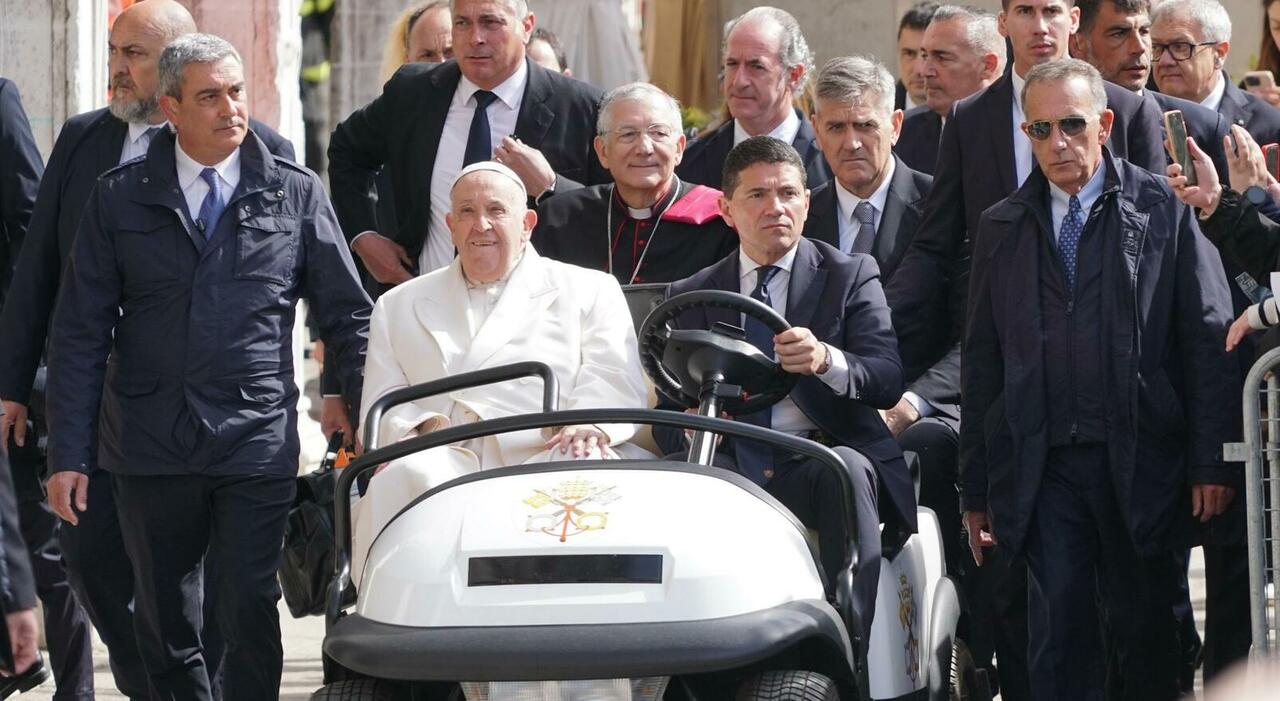Sunday 28 April 2024, 09:54 - Last updated: 23:36
Pope Francis in Venice issues cross-cutting messages to the world of politics. "We need our Christian communities, our neighborhoods, our cities, to become hospitable, welcoming, and inclusive places." This part of the homily read in St. Mark's Square seems to be a response to the Vannacci case, the general nominated by the League who recently requested separate classes for disabled children.
Just before, the pontiff, while meeting artists at the Giudecca, reiterated the same concept but spoke of art as a code to fight marginalization, racism, xenophobia, and even "aporophobia", a "terrible neologism that - explained Francis - means a phobia of the poor". Adding that today there is also "selfishness that makes us operate as solitary islands rather than collaborative archipelagos". And more. "I implore you, artist friends, imagine cities that do not yet exist on the map, cities where no human being is considered a stranger. That's why when we say foreigners everywhere, we are proposing brothers everywhere".
THE PRISON
The embrace with the artists who created the Holy See Pavilion at the Art Biennale will remain something symbolic. In the deconsecrated chapel inside the women's prison of the Giudecca, in the presence of ministers Carlo Nordio and governor Luca Zaia, under the grandiose artistic work of the Brazilian Sonia Gomez who created long filaments of fabric hanging from the dome, almost like colorful material cocoons, harbingers of future surprises, Francis said: "Artists are called to go beyond. Today it is more urgent than ever that they can clearly distinguish art from the market. Of course, the market promotes and canonizes but there is always the risk that it vampirizes creativity" to imagine a better world without barriers.
THE JOURNEY
Pope Francis' visit to Venice started punctually at 8 am. The first stop was the women's prison of the Giudecca: there he embraces the inmates ("go ahead, courage. Do not give up"), then visits in private the works contained in the penitentiary structure and entrusts a message to the authorities, in particular to minister Nordio to do something against prison overcrowding. "It is fundamental that the prison system also offers inmates tools and spaces for human, spiritual, cultural, and professional growth, creating the premises for their healthy reintegration. Do not isolate dignity but give new possibilities".
TEST
The trip to Venice is considered an important test on his health lately made fragile by a lung infection. Problems that now seem to be water under the bridge judging by the physical stamina he exhibits. Consequently, the future papal programs quite ambitious (including a long intercontinental trip to Papua New Guinea, Indonesia, East Timor) seem to be all confirmed. Francis crosses the bridge of boats on a mini popemobile. He is wrapped in the usual white coat and gets excited when he finds himself in front of the crowd and the young people he meets in the second stage of the day, at the Basilica of Health. The speeches he gives are perhaps a bit shorter than usual, but he reads them with great energy, as well as transmits strength in blessing and embracing. To reach the young people of the Triveneto he goes up (obviously helped) on the motorboat while the gondolas raise their oars in a sign of respect and greeting as he passes.
YOUNG PEOPLE
"Use the cell phone but still meet people". Francis then entrusts the young people with a mandate, that of being "revolutionaries", not seeking profit but thinking of "doing something that wasn't there before". "Think within you of the children you will have", he added. Therefore, the appeal: "Do not be professionals of compulsive typing but creators of novelties". "A gesture of love for someone who cannot reciprocate: this is creating, imitating the style of God. It is the style of gratuitousness, which takes out of the nihilistic logic of 'I do to have' and 'I work to earn'. The center is gratuitousness".
CLIMATE
In Venice, there are also reflections on climate change. "They have an impact on the waters of the Lagoon and on the territory". That's why, the Pope emphasizes, it is necessary to face the problem "all united".
© ALL RIGHTS RESERVED
This article is automatically translated
